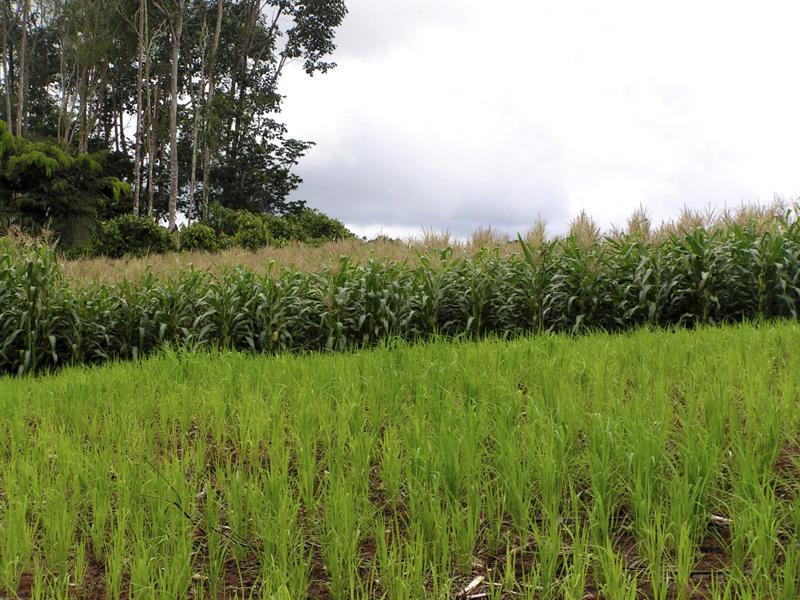
Forests, agriculture and territories in the Amazon
How can we reconcile environmental protection and support for rural populations in this region, which plays a decisive ecological role on a global scale and has huge agricultural potential?

CIRAD’s work, undertaken in partnership with Brazilian teams, is based around three research and training platforms in partnership (dP), and an environmental research observatory (ERO).
Other research is also carried out in partnership by researchers on various topics, such as energy use of woody residues with a view to improving value chain efficiency, by optimizing energy yields and reducing environmental impacts
Brazil is the leading producer or exporter of several agricultural products (sugar, coffee, orange juice, meat, soybean, etc). Crops occupy more than 60 million hectares, and grasslands a further 180 million hectares (for 200 million head of cattle). The country has 0.8 million agricultural enterprises, geared towards exports (linked to the Ministry of Agriculture) and 4.5 million family farmers (linked to the Ministry of Rural Development), with a very wide diversity of social, economic and agronomic situations. Brazil has structured institutions and private companies of international standing in the agribusiness sector.
Brazil is also home to some major natural ecosystems, including 400 million hectares of tropical forest, mostly in Amazonia, and 200 million hectares of savannah, mainly in the Cerrado. These ecosystems play very important environmental roles, with immense biological diversity and important climatic functions. However, they have suffered from high levels of deforestation over the last 20 years, due to agricultural development and over-exploitation of the forest. The country has taken some proactive steps to achieve the COP21 environmental goals, particularly for forest and natural ecosystems.

How can we reconcile environmental protection and support for rural populations in this region, which plays a decisive ecological role on a global scale and has huge agricultural potential?
Brazil benefits from a substantial research and training set-up in support of agriculture and rural development, with Embrapa (a federal agricultural research organization with centres throughout the country), technical organizations located in the states (IAC, IAPAR, etc) and a large number of high-quality federal, state, or private universities. Agricultural training is provided through this network of universities and agricultural and agronomy colleges. Since 2012, Brazil has been implementing a major programme of overseas training in engineering, through the Sciences without Borders programme. Specific funding is provided at federal level by the CNPq (National Council for Scientific and Technological Development) and at state level by the state funding agencies, FAPs.
Agricultural training is provided via a large network of universities and agronomy and agricultural colleges, with backing from CAPES (Coordination for the Improvement of Higher Education). Since 2012, Brazil has been operating a major training programme overseas via the Sciences without Borders programme.
In recent years, Brazil has strongly positioned itself on the international scene (initiatives at the G20, political moves, etc), with a particular interest in the agricultural and environmental sector. The country has also displayed its readiness to become a major actor and contact in the agricultural development of Africa.
The two countries have developed strong relations over many years in the research and training fields. Those relations have been intensified at the highest political level, and have resulted in a strategic partnership between the two countries covering various fields, notably with a memorandum of understanding on the sustainable development of the Amazon biome. These strategies are backed up by several scientific cooperation and training programmes, particularly on agronomy (in the broad sense) and the CAPES COFECUB, Embrapa Agropolis, Guyamazon, and Brafagri programmes.
This partnership has also resulted in a readiness to develop joint operations on some major issues, such as combating climate change, or food security.
Scientific research and higher education have been identified as priorities in this partnership.
R&D projects and appraisals are also carried out with companies from the rubber, eucalyptus and oil palm plantation sectors, along with biomass energy use, etc.
The projects are undertaken with the support of Brazilian agencies, such as state research support foundations like the São Paulo Research Foundation (FAPESP) and several Amazonian state foundations and various organizations and companies operating in Brazil.
These projects are also carried out with the financial backing of the French Embassy, French agencies such as the Agence française de développement (AFD), the French Foundation for Biodiversity Research (FRB), Agropolis fondation, COFECUB, etc, along with regional and international agencies, such as the European Union, the World Bank, the Food and Agriculture Organization of the United Nations (FAO) and the International Fund for Agricultural Development (IFAD).